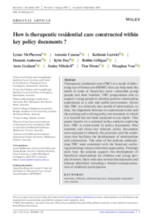Therapeutic residential care (TRC) is a mode of delivering out-of-home care (OOHC) that can help meet the needs of some of Australia's most vulnerable young people and their families. TRC programmes aim to support young people to develop positive relationship experiences in a safe and stable environment. Given that TRC is a relatively new model of intervention, to date, the alignment between its aspirational aims and the existing and evolving policy environment in which it is located has not been analysed in any depth.
This paper reports on a national policy analysis exploring how TRC is constructed in policy documents. One hundred and thirty-two relevant policy documents were analysed to identify the practices and the conditions that facilitate the development of relationships and connections. The aims of the policies underpinning TRC were consistent with the literature outlining promising trauma-informed approaches. Findings show how the policies support the development of beneficial relationships for children and young people; however, there were also several discrepancies and silences identified, including a limited conceptualisation of children's participation.

